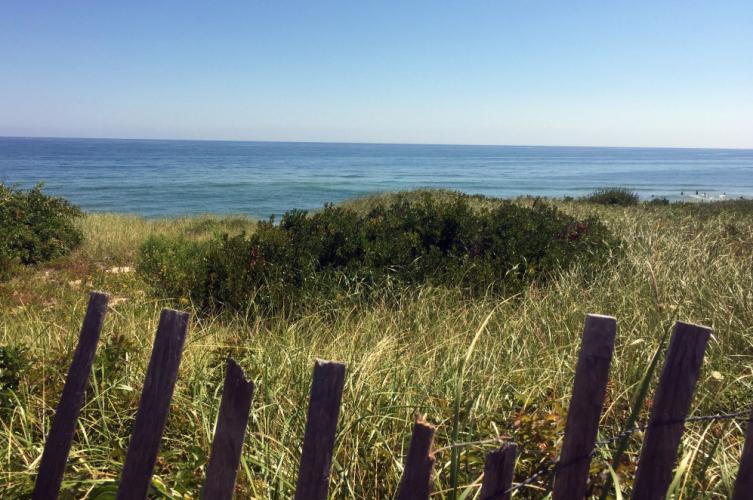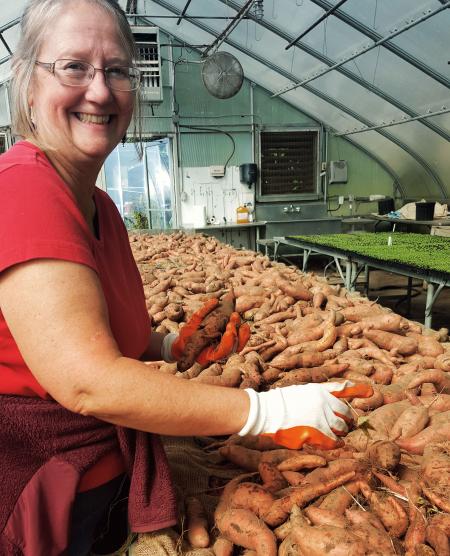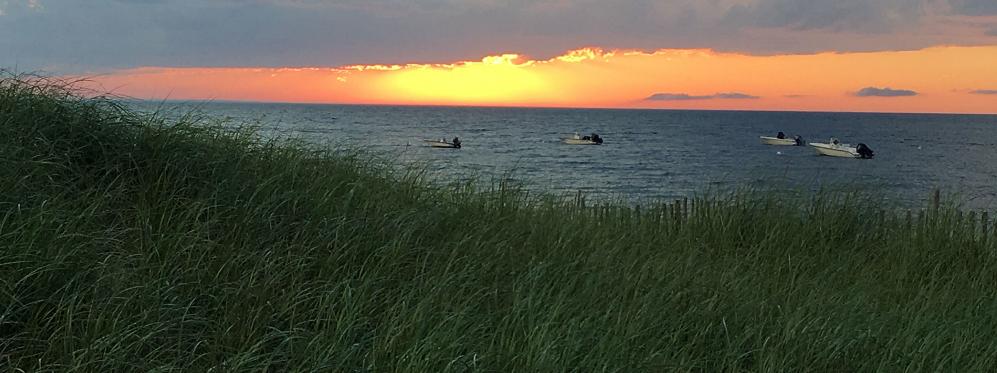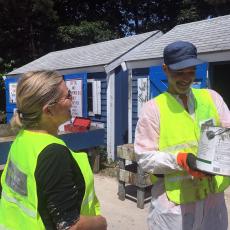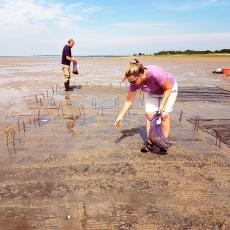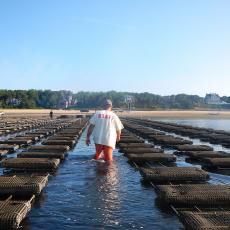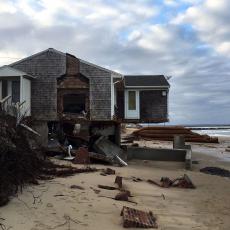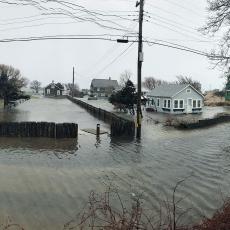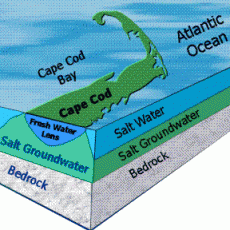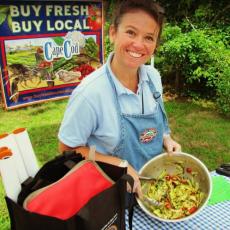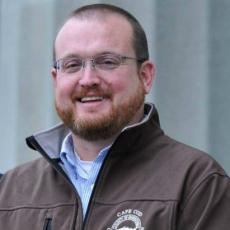In Our Spotlight
Protecting the Cape
There’s the Massachusetts that most of its almost 7 million residents know. And then there’s Cape Cod. The thing about Cape Cod is that it has a unique ecosystem quite different from that of the rest of the Commonwealth. The differences include fragile water supplies susceptible to contamination, serious beach erosion and seafood safety challenges. These very real issues raise questions that demand reliable answers and an educated public.
During the summer of 2017, Mother Nature came knocking on Cape Cod’s door three times, delivering damaging coastal storms that wreaked havoc in many towns.
That’s where Cape Cod Cooperative Extension (CCCE) comes in. As different from the statewide UMass Extension as Cape Cod is from, say, Worcester County. The key difference is that Cape Cod Cooperative Extension continues to be funded by Cape Cod’s own Barnstable County government, long after the other counties in Massachusetts (Plymouth County excepted) largely faded into historical memories. This has given Cape Cod Cooperative Extension both the resources and the independence to focus on the unique circumstances faced by this arm-shaped peninsula best known for its beaches, an architectural style of small practical houses, and for great summer vacations.
Cape Cod Cooperative Extension maintains a robust portfolio of educational outreach around key issues and needs. This story you are reading today focuses on three of those areas – hazardous waste and water quality, nutrition and food safety, agriculture and gardening—but the entire CCCE effort also includes 4-H youth development, marine and aquaculture, ticks and bugs, coastal processes, and natural resources. We published a story on some of these other areas a couple of years ago. View story.
Love Your Local Water. It’s a Cape Cod Thing.
Kalliope Chute could very likely talk about the mission of her program—hazardous waste collection and water quality—in her sleep. Chute is driven to keep Cape Cod’s water supply clean and available for everyone.
When Chute arrived at the Cape Cod Cooperative Extension in 2004, she found that the public information about the topic was full of facts and figures, but was hard for the typical resident to understand and then act upon. Chute has transformed the program over the years, creating fliers that are more vibrant and user-friendly (though still packed with information). It is now a lot easier for the public to understand their own role in keeping water safe… the use of appealing graphics interwoven with individual easy-to-understand action items helps.
One hundred percent of Cape Cod’s water supply comes from an unconfined sole source aquifer. That means it has no protection from pollution on the aquifer’s sides. How does it stay clean, given all the human activity up top? Hard work, intense public education starting in elementary schools, water filters and, sometimes, reverse osmosis. To illustrate the fragility: one gallon of gasoline can contaminate up to 1,000,000 gallons of water, according to the US EPA.
The breadth of Chute’s community outreach is impressive. One day she works with first responders, municipal officials and water treatment facility managers and the next she can be found with fifth graders and AmeriCorps Cape Cod members as team leader for “Groundwater Guardians.” This program presents over 20 interactive activities about water education in Cape classrooms.\ In the school year 2017-2018 taught an always popular lesson, “The Good, the Bad and the Algae,” to over 2,000 students in Barnstable County.
In rapid fire talk, Chute reels off details of hazardous materials that, if not collected and diverted from the waste stream, would be extremely harmful to the environment, first responders, and families. But collect it, they did! In just one year, 33,000 pounds of pesticides; over 4,000 flares (flares contain the chemical, percholate*); 19,000 pounds of sharps/needles; and 332,000 gallons of hazardous waste from 5,900 households (paint, gas, cleaning liquids, etc.). Wonder what happens to this waste? Out of sight, out of mind? No, it goes to a facility in Rhode Island where these materials are upcycled, recycled, incinerated or reblended. Want more info?
What drives her so hard? Kalliope Chute is clear about this: “Clean water is essential to life, so we need unrestrained access to clean water we all can enjoy.”
*According to Tom Zoeller, UMass Amherst professor of biology, perchlorate is well-known to reduce the ability of the thyroid gland to concentrate iodine, an essential nutrient required to make thyroid hormone. Although incidental exposure to perchlorate has not been shown to cause overt hypothyroidism, it does appear to lower thyroid hormone levels, which can be particularly bad for pregnant women.
Nutrition and Food Safety
Have a hankering for skate wing? (What is skate wing, you ask?) What about shark kabobs, monkfish or dogfish? Sue Bourque and Kim Concra, skilled nutritionists at Cape Cod Cooperative Extension, serve delicious recipes and present fun fish facts to move you past traditional dinner plates of cod or salmon. For example, did you know that sharks and skates have no bones but rather a skeleton of cartilage? This makes skate meat good for kids. Skate is mild, sweet and can be caught right off of Cape Cod. By obtaining “underutilized” fish from Cape Cod Fisherman’s Alliance, they create recipes, nutrition facts and videos for public outreach and education.
Elderly year-round residents comprise a greater percentage of Cape Cod’s population than they do in other parts of the state, and these seniors can feel isolated during the winter months. As a result, Bourque and Concra work closely with senior centers to encourage social outlets around healthier diets that incorporate fresh foods. They offer cooking demonstrations, nutrition classes at centers, and even take seniors on field trips to farm stands searching out both pretty and ugly vegetables, for example. Some farm stands offer SNAP or Healthy Incentive Partnership (HIP) benefits. A big advantage of going directly to these farm stands is that seniors get access to assistance they are already eligible for, but may never have used.
Concra is enthusiastic about the wide variety in her work. On Monday, she can be found working with public health nurses to help people gain access to fresh foods through a “Foods to Encourage” program. Tuesday might find her in a meeting in Eastham where she works with Amanda Kinchla, UMass Amherst extension assistant professor, as they help bring food businesses to market. And, of course, any summer day could be a food preservation opportunity. Concra becomes animated as she shares the fact that any food preservation book in your kitchen should be published after 1994. Your Grammy may have boiled her pickles or green beans in a jar and then popped paraffin on top to seal it, but that is not recommended today. Paraffin can cause mold and shallow water for steam canners is better than a water bath, and it saves energy. She recommends following National Home Preservation Guide. There is so much to re-learn. Concra says, “The beauty of Extension is connecting people to updated information.”
Bourque likes distributing unfamiliar fish at food pantries or working in her test kitchen creating delicious choices to address the needs of elders, families and children. A SNAP-ED grant allows her to work in three food pantries. Bourque says, “I love the variety of my work, every day is different as I work on interesting programs with kids, seniors, or colleagues.” After 18 years on the job, she remains highly engaged.
Their work connects very nicely with a robust “Buy Fresh, Buy Local” initiative...
Buy Fresh, Buy Local
...and speaking of “Buy Fresh, Buy Local,” meet Rebecca Yavner-Westgate. She is a huge proponent of marketing, buying and eating locally-sourced foods. With grandparents who fished commercially, she grew up with a unique appreciation of what it means to harvest and eat local foods and she touts her history of eating fresh sea products as a motivator in her life. CCCE Director Mike Maguire describes Yavner-Westgate as very active in her support of the buy local program. She coordinates closely the nutrition and horticulture staff on other projects and connections to be made around farmers markets. Yavner-Westgate also heads up CCCE public relations efforts and designs educational materials. Like other staff at CCCE, she is a dedicated employee whose job and personal outreach intersect beautifully.
Yavner-Westgate works with nutrition educators to connect people and businesses to locally-grown farm and sea products. Activities she coordinates for “Buy Fresh Buy Local” include visits to farmers markets (in collaboration with Bourque and Concra) and other food-related community events with educational displays, recipes, and member guides.
Her collaborations on Cape Cod go wide and deep: CCCE, educators, food access networks, Mass Grown and Fresher, statewide programs: the list is extensive. Anyone who enjoys eating seems to be happily caught up in her food web where she promotes the benefits of healthy local eating. A Do-It-Yourself (DIY) attitude pervades her interaction with local hobby farmers. She connects to local organic growers who have bumper crops and then links them to Harvest for The Hungry event all synched up with fall harvest. Yavner-Westgate organizes 100 volunteers who become farmers for a day. Last year, they harvested and then distributed over 5,000 pounds of fresh food to two large food pantries in Falmouth and Harwich for redistribution to smaller outlets. She has also worked with Cape Cod Fisherman Alliance on two local food videos for skate and scallop pizza. “I work with the public on a daily basis and love that about my job.”
Caring for the Plants of Cape Cod
Russ Norton, Horticulture and Agriculture Educator, a graduate of UMass Amherst’s Stockbridge School of Agriculture, is well-prepared to get the job done. His territory is a big one, the entire breadth of Cape Cod. Demonstration gardens in Falmouth, diagnosing plant problems, and finding some success with treating plants for gall wasps are just a few tasks that keeps Norton hopping. The gall wasp problem, especially with black oak trees, got a big hand-up through research at Professor Joe Elkinton’s lab at the University of Massachusetts Amherst.* Working together, Norton and Elkinton have been able to offer better treatments for this pest.
During the summer of 2017, Mother Nature came knocking on Cape Cod’s door three times, delivering damaging coastal storms that wreaked havoc in many towns. A year later, clean up remains an ongoing effort as they continue to haul away miles of pitch pines that fell like match sticks. Beach erosion brought a different wave of damage. What do you do when you have loss of specific beach grass on fragile dunes? First, you are thankful for the visionary action of Norton who, several years ago, started a native nursery of beach grasses. He collected and planted native seeds to fill the vacuum for dune grasses and that effort is paying off today as many residents are able to re-establish natural vegetation. Norton continues to advise coastal towns on ways to mitigate destruction from these tremendous weather events, all too common in this part of the state. Norton enjoys working with individual professionals, and as an excellent diagnostician he is finding success at trouble shooting problems with plants for Cape Codders.
The People of Cape Cod Cooperative Extension: Their Dedication is Clear
Cape Cod Cooperative Extension staff have served the public thorugh outreach and education since 1914 with deep roots in the land-grant university system. Unlike the rest of Massachusetts, its office has remained county-funded. While residents in this unique place contact the CCCE office for help with traditional extension issues such as nutrition, agriculture and 4-H, it is their specific fragile ecosystem that requires very different solutions from the rest of the Commonwealth.
Mike Maguire, director of CCCE, was asked what is different about the work of Extension on Cape Cod than in the rest of the Baystate. He replied, “Many of our efforts include traditional outreach and education, but our geography requires solutions that folks in Worcester or Great Barrington don’t need to consider. For example, aquaculture development, shellfish habitat assessment, disposal of flares used on marine vehicles and methods to halt beach erosion after powerful storms, all keep us actively engaged with residents of Cape Cod. Our team truly is knowledgeable and committed to improving the life of residents and visitors to the region.”
More information about their work and how to contact Cape Cod Cooperative Extension.
